#The Dark Eye
Explore tagged Tumblr posts
Text
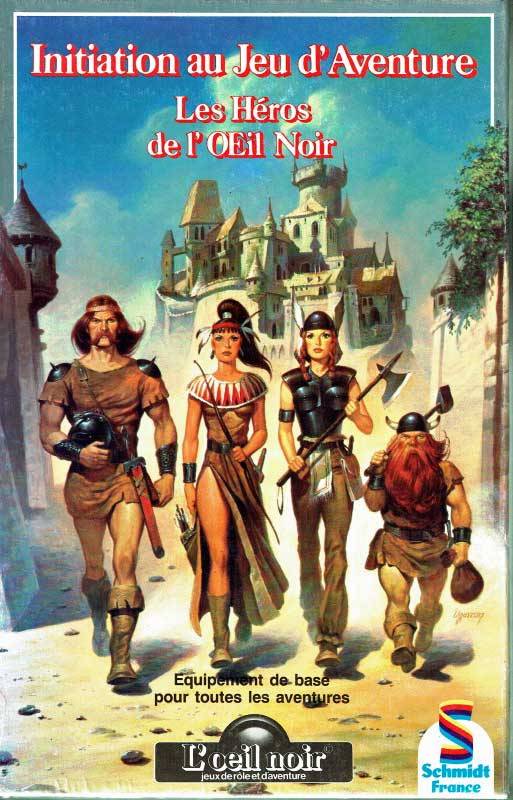
The party sets out for adventure -- Ugurcan Yüce cover for The Dark Eye introductory box set, Schmidt Spiele -- Schmidt France version "L'Œil noir;" originally released in German as "Das Schwarze Auge" (DSA). This art has been attributed to a second alternative version of the 1984 1st edition, and to the 1988 2nd edition.
#The Dark Eye#Ugurcan Yuce#Ugurcan Yüce#Das Schwarze Auge#l'oeil noir#JDR#jeu de role#jeu de rôle#L'Œil noir#DSA#Initiation au Jeu d'Aventure#fantasy RPG#adventuring party#castle#fantasy castle#1980s
176 notes
·
View notes
Text
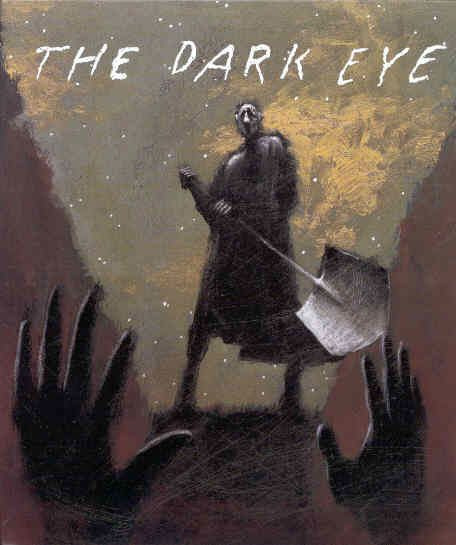
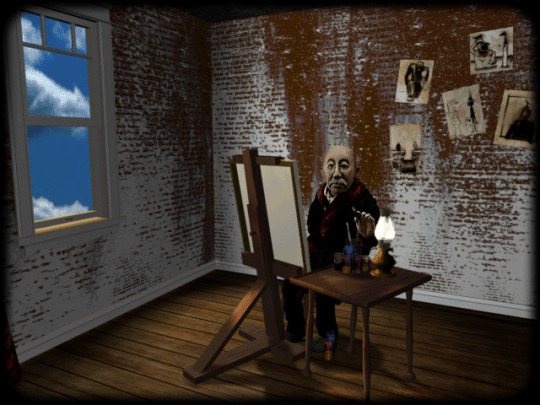
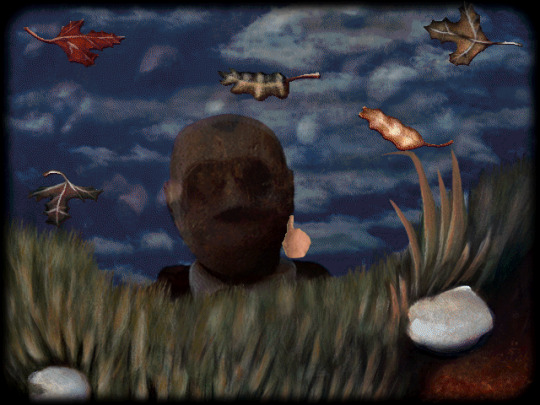
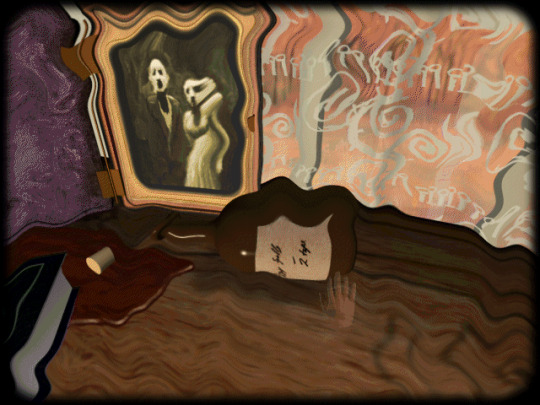


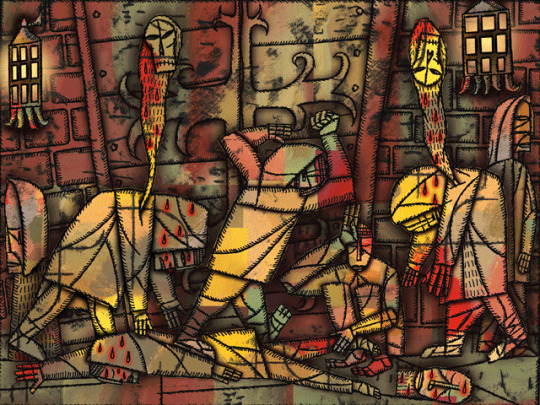
The Dark Eye (1995) is a first-person psychological horror adventure where you recite Edgar Allan Poe's stories through the perspectives of both murderer and the victim.
It features uncanny valley grotesque, stop-motion visuals, and clay-modeled characters.
Plays in a classic point-and-click adventure style, the game doesn't really put you into any life-or-death situations or doesn't give you choices. There are stories to go through and you are there to witness them.
Throughout the game, you go through some of Poe's favorite stories: The Cask of Amontillado, The Tell-Tale Heart, and Berenice.
Additionally, you can listen to William S. Burroughs' voiceovers featuring The Masque of the Red Death and Annabel Lee.
Many of these scenes play as QuickTime movies. Sometimes in full-screen, or sometimes in smaller, looping segments. The game as a whole has an experimental look and these only add to its already creepy atmosphere.
While the game features Poe's known stories, it doesn't ONLY rely on them but rather uses a unique plotline as a framing device. The gameplay occurs in two different aesthetic modes. While one is more realistic, the other is dreamy or perhaps even nightmarish.
Set in the late 1800s (as interpreted, not confirmed), the nameless character visits his uncle Edwin. Controlling this character, you meet Edwin himself and your brother Henry.
You then have a whiff of the paint thinner Edwin was using while painting, and go into a "trip".
Developed by Inscape, it was released for Windows and Mac OS. The game is now in abandonware status and you should be able to find it online.
If you want, can play it on your browser here: https://classicreload.com/win3x-dark-eye.html
#horror#horror games#horrorvisuals#horror game#retro#nostalgia#point and click#the dark eye#edgar allan poe#gothic#gothic horror#gothic horror story#horror story#horror stories
203 notes
·
View notes
Text

I made a Horny Bard (TM) DSA RPG Character by accident.
Meet Rahjadan Salpicon Zornbrecht-Entenza *plays lute jingle* and his trusty dog Don Goldo *raff raff*
24 notes
·
View notes
Text




14 notes
·
View notes
Text


My contribution to "Finsterwacht", a collaboration of some of my favorite fantasy authors and the folk-metal band Saltatio Mortis, to create a multimedia adventure, set in The Dark Eye TTRPG universe. And it sold out after barely a week 🤯
I was tasked with creating 2 of the 4 playable main characters - Alea the Modest and Farnlieb of Schroffenfels-Binsböckel. ^^
#das schwarze auge#the dark eye#finsterwacht#saltatio mortis#ttrpg#ttrpg art#fantasy character#fantasy illustration
20 notes
·
View notes
Text







Fires enlighten the sky We are the bane of the dark Rondra, redeem our prayer Take our side, for we are the Guard Warriors, rise up We‘re the Darkenguard Be the light at the end of our world Hold these towers through the Orkensturm Stand together, for we are the Guard
Saltatio Mortis feat. Blind Guardian - Finsterwacht/Darkenguard
#saltatio mortis#folk metal#das schwarze auge#the dark eye#musicedit#bandedit#blogmusicdaily#bandsdaily#mine*#metaledit#ttrpg music#yt video quality is garbage.. ah well lol#what was it again? 'we didn't wanna do another video in which we have to act' *make a short film in which they have to act* lol
15 notes
·
View notes
Note
When i was younger here in Germany most ttrpg players i know played a system called "Das Schwarze Auge" (DSA), which has a fantasy setting comparable to D&D. (and honestly the rules are rather complicated in places, too) But over the last couple of years i kinda saw this game fade into background. Because of the dominance of US-American popculture D&D overtook the market. And while i generally enjoy D&D, it kinda worries me how much the system just pushes other systems out of the picture.
I mean, DSA sucks too (at least the version I played. Unnecessarily complicated resolution mechanic plus I really don't care about medieval fantasy at all...)
Like, I get what you mean, but let's be real, DSA was the D&D of Germany. It had generally the same role in the German TTRPG space, and I personally don't think one cultural monopoly is inherently better than another?
#dsa#das schwarze auge#the dark eye#dnd#dungeons & dragons#dungeons and dragons#d&d#ttrpg#tabletop rpg
13 notes
·
View notes
Text

This year is the 40th anniversary of The Dark Eye (Das Schwarze Auge) and since my life as a roleplayer started with the short scenario "Silvana´s Befreiung" (Silvana´s rescue), I wanted to paint a cover for that for a long time. As it´s not an offical cover by @Ulisses, I changed the brand name to "Das Blaue Auge", which means "The Black Eye" in direct translation which most convieniently directly translates back to Das Schwarze Auge. Ain´t I clever :)
#das schwarze auge#the dark eye#digital art#fantasy art#digital illustration#fantasy illustration#digital painting#silvanas rescue
3 notes
·
View notes
Text
Ability Scores in 5e & Other RPGs
This little rant is inspired by a post by a blog named The Angry GM, titled "Your Ability Scores Suck" as well as a post titled "8 Abilities - 6, 3, or 4 Ability scores?" by DIY & dragons, because those two articles and my past few months of looking at various TTPRGs have led me to some insights into my own philosophy in how I like TTRPGs and how I feel about 5e's Ability Scores.
So let's look at how a couple of RPGs handle ability scores or their equivalents. Namely I'll look at D&D 5e, Pathfinder 2e, The Dark Eye (4th Edition Revised), CAIRN, and Pokémon. Yes, Pokémon is relevant to this. And it'll actually be the second game we'll discuss, but the first obviously has to be...
D&D 5th Edition
D&D famously has six ability scores: Strength, Dexterity, Constitution, Intelligence, Wisdom, and Charisma. In most situations the exact ability score no longer is that important, however, since from 3e onwards d20-based checks have become the near-universal input you play D&D with. This means that instead the ability score modifier is key, which ranges from -4 to +5 for most player characters.
Now while these six scores might seem pretty equal, players have quickly figured out that certain ability scores are more desirable than others, unless you play specific classes.
Dexterity, Constitution, and Wisdom are for example the three most common saving throws. 109 out of the 361 spells in the Player's Handbook force a saving throw using one of these three ability scores, while Strength, Intelligence, and Charisma only have 24 spells. Thankfully every D&D class gives proficiency with two saving throws, one of the three major ones, and one of the lesser ones (and certain subclasses as well as the monk get more saving throw proficiencies, but that's besides the point).
Additionally, when it comes to skills, and thus out-of-combat usefulness, Strength only has one skill tied to it by default (Athletics), while Constitution has none. Charisma has four skills to its name, Dexterity three, and both Intelligence and Wisdom have five.
Now the DIY & dragons article mentions that there are effectively three axes you have to cover with your ability scores: physical vs mental, force vs grace, and attack vs defense. That leads to eight abilities total. In 5e, using what we know about the game, we can make some great deductions.
For one, Strength is almost exclusively concerned with physical force attack, while Constitution nearly exclusively covers physical force defense. Dexterity meanwhile fully covers physical grace attack, as well as physical grace defense, since it affects AC and is used for Stealth, as well covering evasion-type saving throws. Dexterity is incredibly powerful in 5e, arguably the most powerful ability score.
On the mental stat side, the lines are less clear. All three ability scores can be used for offence, though Intelligence, being the casting ability score of only wizards and the generally utility-based artificers is the least offensive of the three. Still, its association with wizards means it probably is best associated with force, because fireball. Charisma easily can be sorted into grace and is mostly offensive, and Wisdom straddles the line between force and grace, but is also both clearly offensive and defensive.
As you can see, Intelligence & Wisdom & Charisma are rather ill-defined, a point also made by the The Angry GM article, but mechanically Wisdom is universally useful, while Charisma is either super important (because you're playing either a Charisma caster or a face-type non-caster, such as a rogue), or can easily be sidelined/dumped. In fact a lot of tables seem to disregard or minimize Charisma when it comes to roleplay, my tables have definitely done that. Mostly because you don't want to have players not participating in roleplay encounters because they don't have at least a +2 in Charisma and several skill proficiencies in that area.
Speaking of proficiencies, for skills the maximum you can add is +6 or +12 if you have expertise, while with saving throws the maximum proficiency bonus is +6, so with saving throws in particular, a +5 for a saving throw from that relevant abilty score is a massive defensive boon, though it's often less relevant for skill checks.
This knowledge, as well as the known issues with Intelligence-based skill checks often being seen as gate-keeping plot relevant information, leads to the realization that Strength, Intelligence, and Charisma are the three most frequent "dump stats", with the latter two in particular often having implications in out-of-combat situations, while Strength is a "safe" choice for full spellcasters.
Now let's think about how other games handle this... Let's begin, as I threatened in the beginning, with...
Pokémon
Pokémon famously uses six so-called base stats for its collectible creatures: HP, Attack, Defense, Special Attack, Special Defense, and Speed. Using the system described by DIY & dragons, Attack and Defense clearly map onto the physical, and Sp. Attack and Sp. Defense clearly onto the mental. There is no distinction made between grace and force. HP is a universally defensive stat, and Speed is both offensive and defensive.
Naturally, Pokémon doesn't involve dice rolls. These stats are used for formulas and comparisons. But you can already see that Pokémon, at least since Special got split into Sp. Attack and Sp. Defense starting in Gold & Silver, has a clear division of these stats, with it being clear what they do.
Now due to the mechanics and the goals of Pokémon, an individual character (read: the actual Pokémon) doesn't need to have balanced stats. Largely also because these stats only affect combat, the main mechanic of these games. Any out-of-combat activity present in Pokémon games in fact uses distinct stats, completely distinct from the base stats of the Pokémon. These can then be discarded/put into the background when that out-of-combat activity, such as Pokémon Contests, is removed from subsequent releases.
Now let's look at a D&D-related game that has a different approach to ability scores, because it provides a stepping stone to look at different RPGs...
Pathfinder 2nd Edition (Pre-2023 Revision)
Pathfinder, being a game spun out off the 3rd Edition of D&D, also uses the six ability scores that D&D uses: Strength, Dexterity, Constitution, Intelligence, Wisdom, and Charisma.
Just like with 5e, Pathfinder associates certain skills with certain ability scores, and just like 5e, Strength and Constitution are connected to only one and no skills respectively.
Still, that's just part of the bigger picture. Pathfinder 2e, just like D&D 3e, doesn't use ability scores as saving throws. Rather it uses three distinct saving throws that are tied to ability scores. Those saving throws are Fortitude (Constitution), Reflex (Dexterity), and Will (Wisdom). These are, for the keen-eyed, the same ability scores that are the primary saving throws in 5e. This means that defenses are covered exclusively by these three ability scores, and of these Constitution remains purely defensive, while Dexterity and Wisdom also have offensive capabilities. Still, the offensive power of Dexterity is lowered because in general it cannot be used to increase your weapon damage, contrary to how 5e does it.
It should also be noted that both when it comes to skills and saving throws, the calculations for rolls are very different than in 5e! If you are proficient with a skill or saving throw, you add both a bonus equal to your degree of proficiency (from +2 to +8), as well as your character's level, to the roll, in addition to your ability score modifier. This leads to massive bonuses, especially since magical effects can be added to that, too. Of course Pathfinder uses a sliding scale to determine difficulty classes and has a degrees of success system, but with that knowledge, the -4 to +5 you add to your rolls will matter less than 5e's ability score modifiers do. In general, as long as the modifier is at least a +1, it's fine.
This has actually led to Wisdom being considered a dump stat for many Pathfinder players, and that especially applies when playing with one alternate rule that I want to highlight.
In the Gamemastery Guide, the Alternative Scores variant rule splits Dexterity into Dexterity and Agility, merges Strength and Constitution, and makes Charisma rather than Wisdom the relevant ability for Will saving throws. That variant rule acknowledges the power of Dexterity and the relative weaknesses of Strength and Constitution, but somehow strengthens Charisma further. I don't have any numbers or insight on how popular this alternate rule is, but given what I know about Pathfinder 2e character optimizers, I wouldn't adopt the change to Will saves if I were to run this variant rule myself.
Still, the knowledge of these three saving throws puts us nicely into the realm of indie RPGs, which have really run with this. So let's look at one as an example.
Cairn
This lovely little game written by Yochai Gal has been a well-supported indie darling and is currently in a playtest for a 2nd edition.
Cairn uses three ability scores: Strength, Dexterity, and Willpower. It also uses a d20 roll under system, contrary to 5e and Pathfinder. This means that you aim to roll below your ability score, rather than adding a number to a d20 roll and seeing if you can meet the difficulty class threshold.
They are also, in combat, mostly defensive. Strength in combat mostly concerns surviving blows. Dexterity is used to determine if you move before the enemies and for escaping combat. Both Strength and Dexterity can be used for saving throws against certain spells. In combat Willpower is necessary to cast spells without suffering penalties.
Offensively none of the three ability scores are that important. They don't add to damage, they aren't important for making attacks, or anything of the sorts. Spellcasting outside of dangerous situations usually doesn't involve die rolls either.
This makes the three ability scores very balanced, but it also gives them comparatively little meaning. They are your protection from harm. Including out of combat. But Cairn doesn't know skill checks whose failure state isn't "nothing happens". If player characters have no pressure, they succeed. Especially if they have useful equipment for it.
Using the DIY & dragons blog post as reference, Strength only represents physical force defense, Dexterity only represents physical grace defense, and Willpower represents mental grace and force defense.
So, let's look at a different roll-under system, one that might provide additional inspiration for game designers...
The Dark Eye (4th Edition, revised)
The German TTRPG The Dark Eye (Das Schwarze Auge) is old, almost as old as D&D, and in its design its often as an antithesis for D&D. It's incredibly math-y, has a generally less heroic (but also categorically "good") playstyle, and is a class-less (kinda), level-less system. To ensure I know what I'm talking about, I'll focus on the 4th edition, which has by now been superceded by its own 5th edition, because that's the one edition of it I actually played.
DSA (its German acronym which I will use for brevity's sake) uses eight attribute (!) scores:
Courage, Cleverness, Intuition, Charisma, Dexterity, Agility, Constitution, and Strength.
Each of these eight attribute scores affects the character directly. Heroes have base values (melee attack, ranged attack, parry, initiative) that are calculated by adding together set combinations of attribute scores and dividing the sum, most often by 5, to determine those base values. For brevity's sake, let's look at two of these base values: attack and parry. Attack is calculated with Courage + Agility + Strength, while parry is calculated using Intuition + Dexterity + Strength. Both use two "physical" attributes and one "mental" attribute.
Similar rules also apply to calculating how much your character can withstand, be it through their general vitality (which is equivalent to hit points), their endurance (mostly used as a resource for athletic feats), and their wound limit, all of which can be used to defeat characters. Even the amount of astral points, the spellcasting resource, is calculated using your attribute scores. Every attribute is used at least once when calculating these eight values, with only Cleverness, Charisma, and Dexterity being used only for one of these eight fundamental character traits, with Charisma being the least important, because it is only used to calculate astral energy points, which are irrelevant for characters that don't know spells.
Furthermore skill checks in DSA are made by rolling three attribute checks in a row and then using skill points to modify the results if necessary. Skills use either three distinct attribute scores (e.g. Cooking, which requires Cleverness & Intuition & Dexterity), or two attribute scores (with one being used twice, e.g. Perception requires one Cleverness check and two Intuition checks). Simple attribute checks where you use only one attribute are rare, with heavy lifting often being the key example for it. There are also loads of skills in DSA, with the character sheet per default having twenty four skills, with more being common on most characters.
As you can hopefully see, all eight ability scores are used very often and impact your character greatly. They are furthermore more clearly delineated than the D&D standard, however they also don't map onto the DIY & dragons parameters for ability scores, despite having eight of them!
Conclusion
What can we learn from this? Well, honestly, draw your own conclusions. The six ability scores of D&D and Pathfinder are not the "be-all and end-all", that's for sure. You really need to think about what your game wants to do.
Is it just combat-focused? Then all ability scores should matter in combat and to (roughly) the same degree!
Does your game consist of multiple gameplay elements? If yes, then they should all be accessible and fun for players even if their base stats are "bad" in one aspect, while still allowing for specialization of player characters.
Generally, there is no "one size fits all" solution, and this rant hasn't even gone into ambiguity between different terms, the implications of specific terms and associated thresholds, or the exact history of ability scores in D&D before 3rd Edition!
Anyway, I hope this was legible, fun and informative.
#thehomelybrewster#rant tag#ttrpg design#dnd 5e#d&d 5e#dungeons and dragons#pathfinder 2e#The Dark Eye#The Electrum Archive#game design#rpg design#long post
26 notes
·
View notes
Text
How to optimize your tabletop character with minimal headache
This is a tool for building and equipping ttrpg-characters. It might be helpful for people like me who struggle with weighing options intuitively and easily start to feel like they accidentally built their character to be less interesting or effective than other characters at the table.
1. decide on the category you want to comb through
It can be skills to put points into, gear, feats/talent options, whatever. For my example I picked magical items.
2. make a table
First column: name of The Thing (e.g. weapon, item, skill...). Write down all of the instances of The Thing that you want to compare.
Second column: joy - this will denote how much joy it sparks in your heart to have/be able to use The Thing, without taking into consideration how sensible it would be.
Third column: RP - this will denote how well The Thing fits your character concept, be it from an aesthetic point of view, because it fits into your character's backstory, whatever.
Fourth column: practical - this will represent how often you assume you will be able to use The Thing in-game.
Fifth column: effective - this will represent whether this is the best way to achieve whatever The Thing is good for or whether there's better options.
Sixth column: score - this one calculates the end result.
The table then might look something like this:

3. add numbers
Now score each item in each category (joy, RP, practical, effective) from 1-3
1 = not really / no
2 = okay/ it's alright / so-so
3 = yeah!
e.g. I'm playing an orc paladin and I'm checking which of the items I should get for her. She grew up in the city and she aspires to be a knight in shining armor.
Item: Lighter (a magical stone that can make fire).
Doesn't really spark joy, so that's a 1.
Fits her character concept so-so, since she would have had little reason to get one before the adventure starts and she's not very outdoorsy, that's a 2.
Pretty practical, I can imagine it becoming relevant in almost any adventure, so that's a 3.
Finally it's not very effective, because in the setting we're playing, we have many choices for how to make a fire and, most importantly, we'll have an elemental mage in our group, you can snap a fire into existence anytime he likes, so that's a 1 again.
Count it all together and the score comes up to 7/12.
I repeat the scoring until the table looks like this:

Which means that from all the options listed, I would be best advised to get a large light quartz, followed by the lighter.
The closer to 12, the higher in priority it is, the closer to 3, the more easily I can discount bothering to get it at all.
4. notes and acknowledgements
What I like about this system is that it allows me to split a big and hard decision into many small and easy ones, so if I score diligently, I'll arrive at a sensible result that's not just min-maxed, but also takes rule of cool and roleplaying into account.
It might also help with "character build envy" because you didn't overlook any options and made sure to consider everything to the best of your ability. So I hope it's helpful to someone else out there.
... or you might look at this and have the same reaction one of my buddies had, which was:
"you put a number on joy???"
Either way, thanks for reading ^^
-
If you use excel or libre office calc, you can use a formula to automatically calculate the score, which would be
=SUM([first cell with a number]:[last cell with a number])
e.g.
=SUM(B2:E2)
which would automatically add together every number from B2 to E2. Alternatively you can just select the cells and it should show you the result in the down right corner.
#tabletop#ttrpg#ttrpg community#dungeons and dragons#earthdawn#shadowrun#the dark eye#blades in the dark#vampire the masquerade
19 notes
·
View notes
Photo
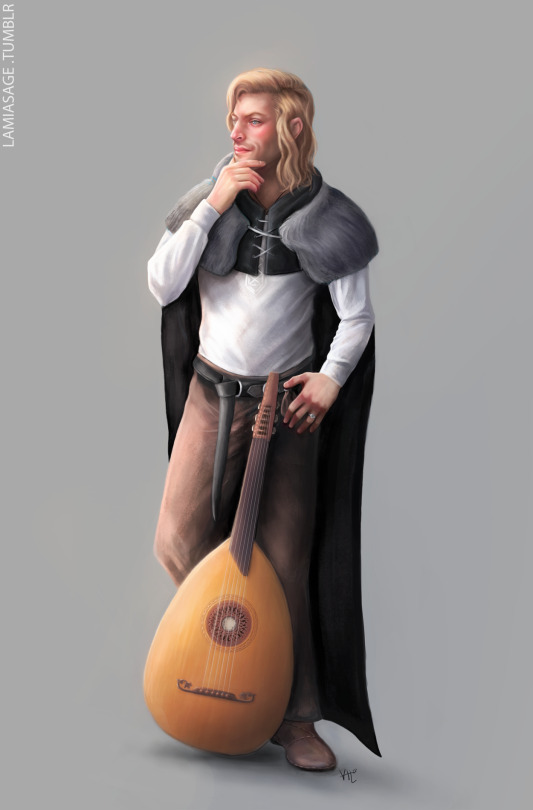
Commission for my dear friend @/intro-verve on Twitter, showing Pettar Peddersen, one of his DSA characters :)
#dsa#dsa 5#Das Schwarze Auge#the dark eye#pen and paper#DSA5#Dungeons and Dragons#TDE#tabletop rpg#tabletop roleplaying#tabletop games#penandpaper#my-art#Fanart#artists on tumblr
54 notes
·
View notes
Text
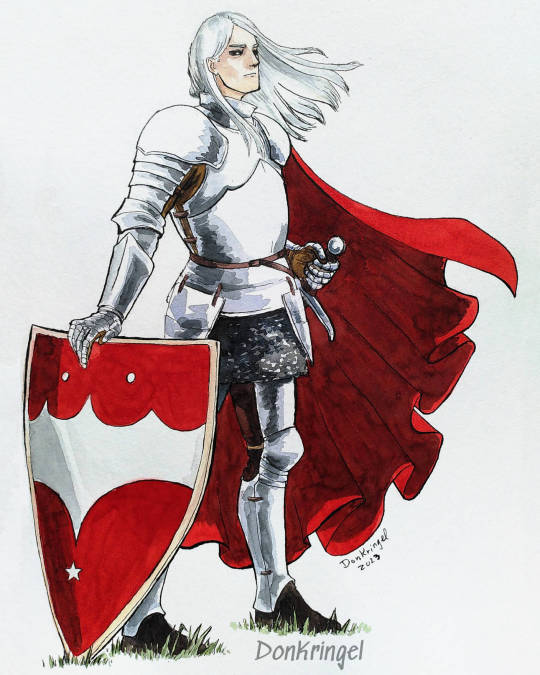
A commission I did at the Feencon this year. Getting to draw something I would like to draw anyway is always a lot of fun, and I’m always up for more people in armor.
#knight#watercolor art#art commission#fantasy#artists on tumblr#armor#das schwarze auge#the dark eye#original character#donkringelsart#watercolor#watercolour
32 notes
·
View notes
Text
youtube
first episode is up!! :0 i heard people here are kinda crazy for this story, but this is the first time ive ever seen it!!
#the dark eye#inscape#the cask of amontillado#ostuber#vtuber#shōko onishi#onishi shōko#mac os#mac os 7#system 7#happymac#classic macintosh#crt monitor#power mac#Youtube
8 notes
·
View notes
Text
I have so many images of my PnP Bard Rahjadan Zornbrecht that I painted but haven't uploaded anything featurng him since the initial character portrait and scribbles, so here's some more.
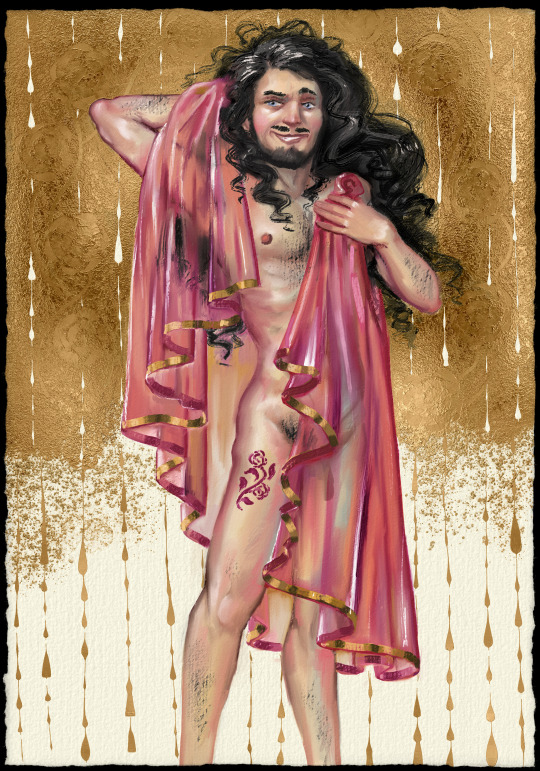
"Spätweihe Rahjadan" good future timeline, where he becomes an acolyte and later a cleric of the goddess of beauty and love (and horses and wine) there's also an evil-timeline I will probably make a post about at some point.
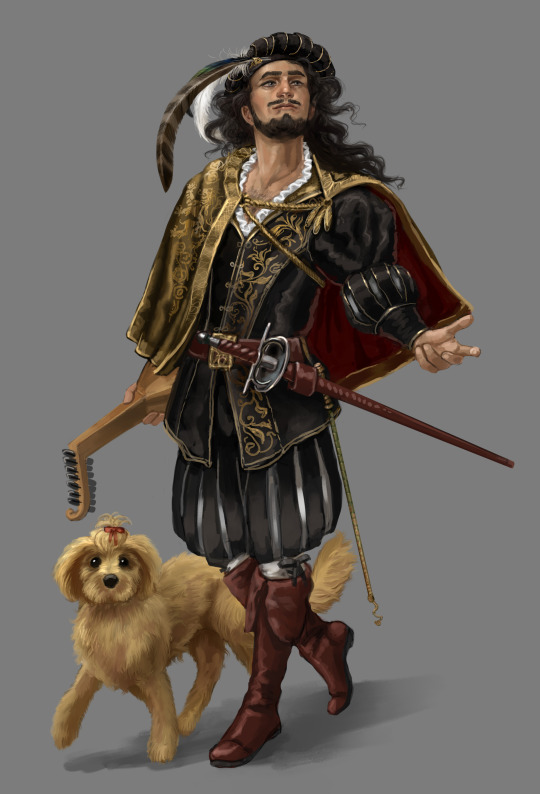
Rahjadan's current character portrait, I decided to do small updates after each session, he bought a fancy hat washed his dog, slew a harpy (big brown feather) and bought a *problematic* riding crop (actually made of Achaz (lizard people) skin, but he didn't quite understand what that meant and though it is just fancy leather)
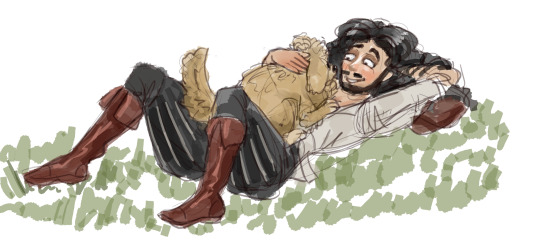
doggo cuddle time
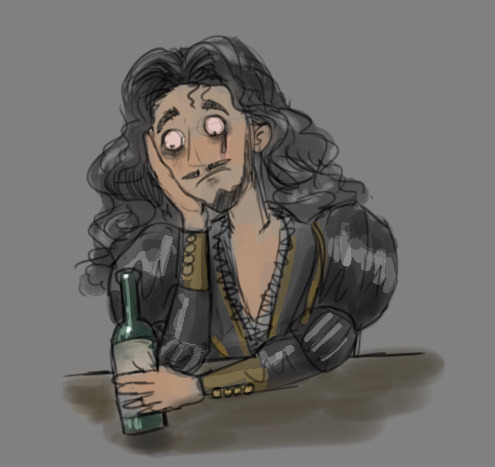

First session: Rahjadan got a letter from his pseudo-mob-boss sister he ran away from, where she threatened to kill his dog if he doesn't comply to do some research on and get in contact with the local crime gang for her. He was so distraught about the letter, that he let himself be peer pressured by his then secretly-a-master-thief-GF to break and enter into the new mansion of the (rest of the) party. ("you got debt with her, here's how you get money fast! I'm doing you a favour here, don't be such a whimp.") He proceeded to very dumb about it, got hold of a cursed artefact, got caught, and now has to do communal service (go on a pilgrimage to escort a holy animal to a monastery along with the party but not get paid for it, while he's chronically broke) and because he convinced the guards and party that he didn't mean it and will repent and its all a misunderstanding he can't really be seen asking about the local crime gang, that would look disingenuous, so now his dog is under threat to be brutalized in the future going forward, if his sister doesn't buy his low effort alibi to throw his now EX-definitely-a-master-thief-GF under the bus.

Speaking of family, that's his wannabe-mob-boss cruel older sister, Duridanya
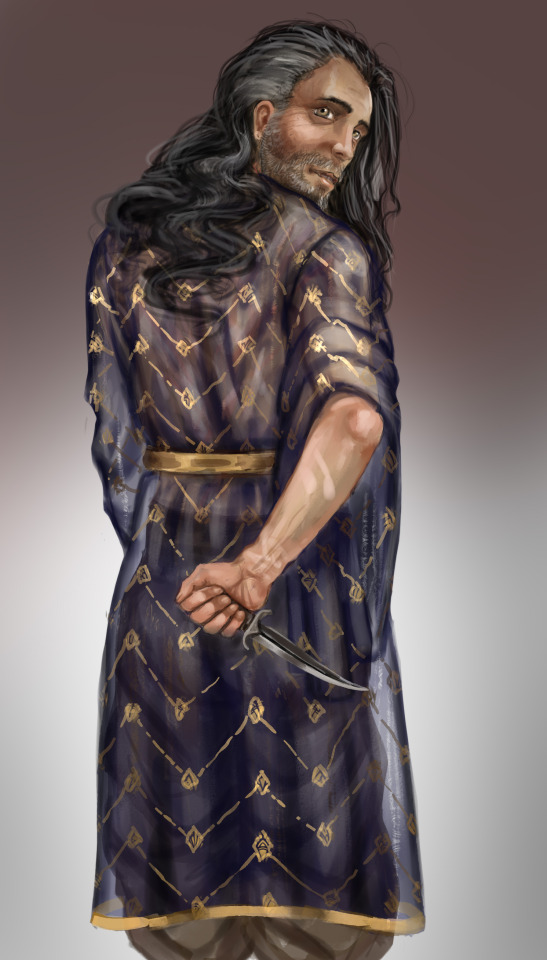
That's his paranoid, mentally messed up dad, Hesindiego.
If his sister is a wannabe-mob-boss his Mother Marchesca was the real mob-boss-terrible-person her daughter aspired to be, but can't quite reach.
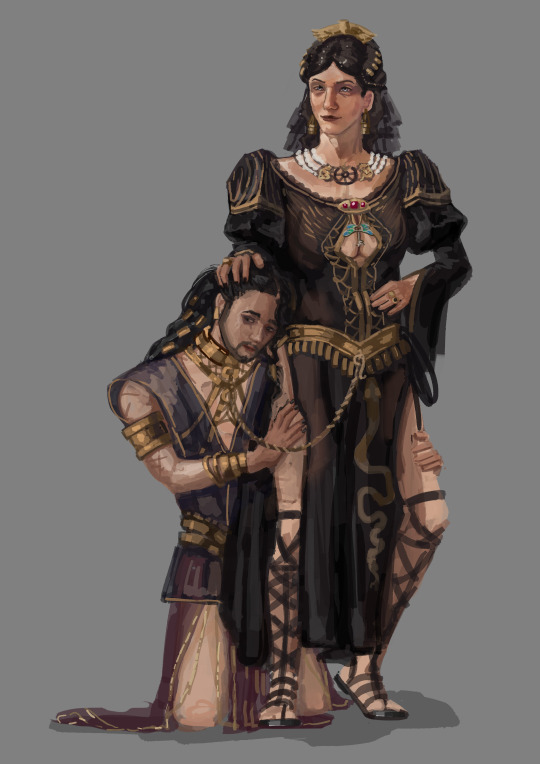
She has been dead for 10 years (poison assassination), but here's his parents before they fled the evil theocratic-slaveholder-citystate Al'Anfa, which was about half a year before Rahjadan's birth. Before that his dad was his mother's favourite domestic slave. The family dynamic is complicated to say the least.
While being raised by both parents, Rahjadan got some very conflicting information regarding morality in general and their grand house (one of the richest in Al'Anfa, and the one with the highest reputation for cruelty).
While his Narcissistic Mother would always tell agrandizing stories about the family, their ancestors and heroc (read horrible) deeds that disowned her and has probably multiple times attempted to assassinate her since she fled north to the city of Lowangen,as if she would come back south gloriously conquering one day. His dad on the other hand told him about the horrors and hypocrisy of Al'Anfa he witnessed first hand. His sister always despised him, and wa shis greatest bully for his entire life, once teh parents got wind of her physically abusing Rahjadan as a kid (10 years age gap) , she switched to emotional blackmail and, after the death of their mother and once this was not working anymore she wsitched to financial blackmail.
His dad completely dropped the mask of pretense and "being a good husband" and that they are "a normal family" after Marchesca's death, and became increasingly estranged from his kids, due to untreated trauma/mental struggles. Although Rahajdan and him are still very much on speaking terms, Rahjadan kinda wished he had his "real dad" back and he feels terrible about it, knowing that it was all an act his dad put on for his controlling wife and his kids, and he never really knew his dad for who he was.
Meanwhile his Sister pressures him with crusing dept he got into to sustain his lavish lifestyle (and the fact he can't say no to buying beautiful and shiny things), to do all sorts of shitty and possibly illegal things for her. She began inserting herself into his private and love life until it reached a breaking point and Rahjadan just decided to screw it all, he's gonna leave the city tonight, and be a wandering bard, at least he'll not starve that way and usually have a warm bed somewhere, and is free to do whatever he pleases (he thinks, he's kind dumb actually, intelligence 9 when the lowest possible value is 8 in the TDE PnP system). And thats the state he was in when he met the Plot (TM).
#rahjadan#feivelynart#feivelyn#das schwarze auge#dsa rpg#rpg bard#art#the dark eye#al'anfa#Zornbrecht
9 notes
·
View notes
Text

So I have a weird obsession with TTRPG Resource books ans want to nail the old Illustration style of get an Inker and go nuts. Everyone whoever read an old TTRPG book knows exactly what im talking about. So here is take 1. A friends character, who's a cultist in disguise as a Priest.
#gay artist#artists on tumblr#art#digital illustration#original character#ttrpg#dnd#dnd art#tde#dungeons and dragons#theblackeye#the dark eye
4 notes
·
View notes
Text

New OC I’ve been working on for the past weeks.
I’ve been illustrating for The Dark Eye ttrpg long enough, that I wanted my own character.
He’s a forest elven spellweaver with his little familiar called Zarasanka, short Zara.
If you are interested in all the details that went into the character design, you can find them on my Artstation:
#das schwarze auge#the dark eye#conceptart#character design#original character#weapon design#ttrpg art
11 notes
·
View notes